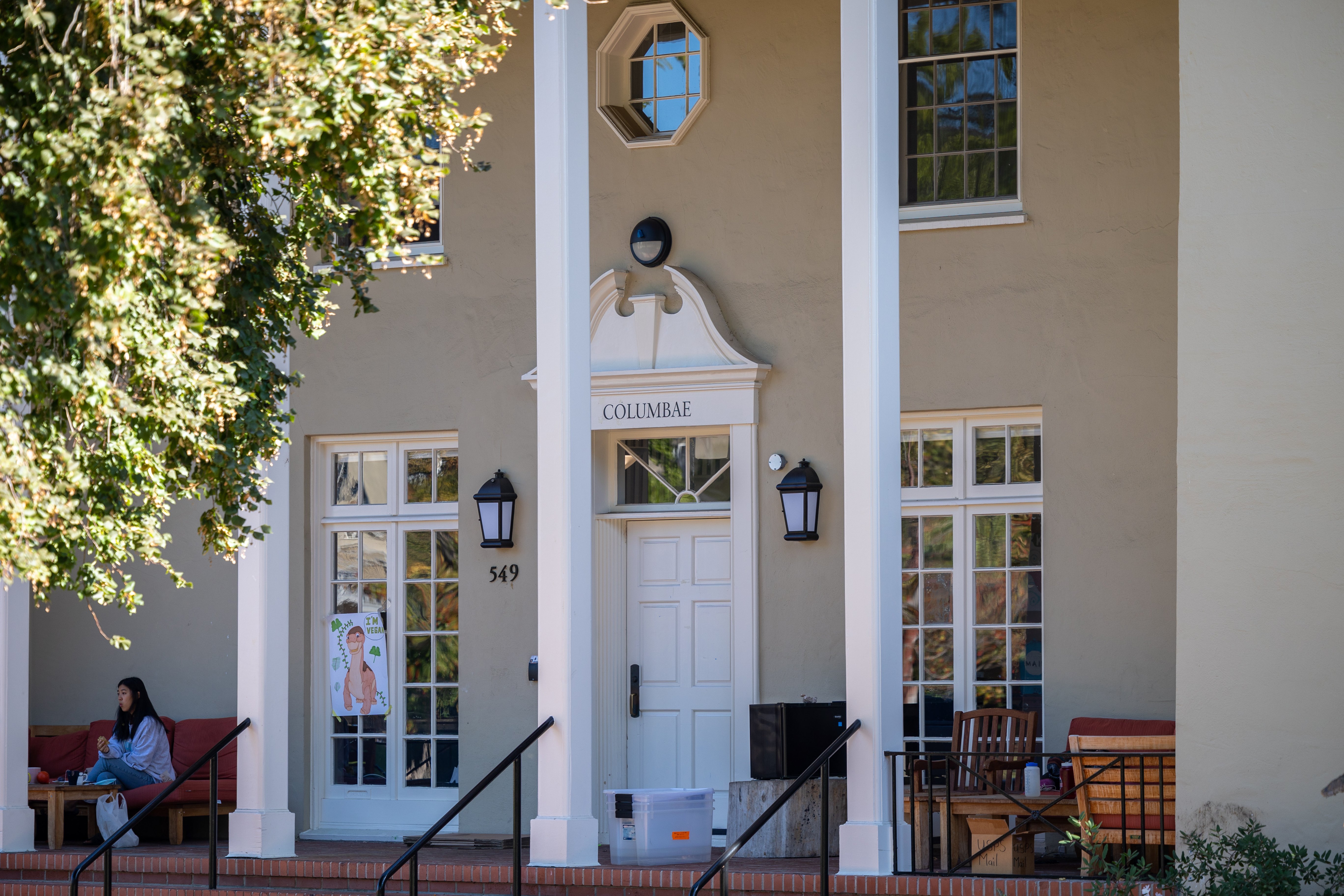Columbae Residential Assistants (RAs) received notice on Tuesday from University administrators that the social justice themed co-op would be discontinued during the 2024-25 school year. Several co-op residents, from Columbae and across the Row, gathered at the dorm to push back against the University decision.
According to an email from C. Matthew Snipp that was obtained by The Daily, only four pre-assignment applications were received for Columbae. “Many more fully committed residents would be needed to run this 53-person house as a co-op,” Snipp wrote. Co-ops, or cooperative houses, involve students in house governance and management, from cooking to cleaning.
Students criticized the choice and argued there was a lack of institutional support towards Columbae, as well as sufficient time to allow residents to seek new applications. But per the University, there’s not enough interest to support the theme house.
The theme “will be discontinued” and the house will become a self-op named for its street address of 549 Lasuen from Autumn 2024, Snipp wrote.
Columbae played a prominent role in campus protests against the Vietnam War in the 1970s and in anti-apartheid protests demanding divestment from South Africa in the 1980s and 1990s. Recently, the co-op was embroiled in campus tensions over the Israel-Gaza war. A former RA was quoted in a New York Times editorial about her experiences in the house and her frustration with how residents handled a banner following the Oct. 7 Hamas attack and military response by Israel. The banner read “Zionism is genocide.”
While Stanford has since limited banners on Row houses, several Palestinian flags hang from Columbae windows and some residents chanted at tour groups who passed the house, calling on the University to divest from ventures tied to Israel.
But the emergency meeting on Tuesday drew residents from several co-ops — who argued that the decision to strip the theme is tied to a broader pattern, where the Stanford bureaucracy suppresses student culture.
“Since the pandemic, Stanford has unhoused a lot of themes,” said Mandla Msipa ’26, an undergraduate senator, who raised examples like the Toussaint Louverture or French House and Haus Mitteleuropa as other houses where the University removed themes. “This is a continuation of stripping Stanford of its culture and vibrancy.”
They collaborated on a petition to preserve Columbae’s theme, which had received over 574 signatures at the time of publication.
The petition made committments to draw more residents to Columbae. “The residential staff will make changes to current house characteristics, such as vegetarianism, in order to accommodate students potentially interested in living in the house and engaging with our social justice, anti-war theme,” student leaders in Columbae wrote.
Residents also stressed that communal living arrangements were not required and students lived in a myriad of rooms, some with only one roommate and others with several.
Columbae RAs also expressed concern that the University did not inform student leaders about the decision before Tuesday, with pre-assignment decisions scheduled to be released the next day on May 15.
The Daily has reached out to the University for comment.
“Pre-assign applications closed on April 10, and we only received a notice yesterday about this decision,” said Jason Hu ’26, an incoming Columbae RA. “They had a month to tell us that we had too few applications, but they waited until the last day before the pre-assignment decision came out.”
Moreover, changes to the pre-assignment process disadvantaged Columbae, according to residents.
Last year, Residential Education changed its policy so that applicants could only pre-assign to one house. “The amount of applications has gone down because we can no longer rank multiple pre-assign options,” Hu said.
According to some RAs, changes in the neighborhood application process confuse students, even though less restrictions on neighborhoods were welcomed by many undergraduates.
“Stanford has not had a consistent application process for two years ever since the COVID-19 pandemic,” said Caro De Sa ’24, a current RA in Columbae. “We don’t know whether Stanford is going to allow us to rank co-ops or whether they’re going to have us choose a single one. That makes it really, really difficult to plan.”
Hu added that the tight pre-assign application schedule affected the amount of pre-assignees interested in Columbae. RAs were asked to prepare the application last minute amid finals.
“They announced the new RAs at the end of winter quarter. Then, during finals week, they told us we had to prepare the [pre-assign] application,” Hu said. “They didn’t even tell us who our fellow RAs were. We ended up using the application from last year, because nobody had time to edit the application.”
Others expressed concerns that the Stanford administration was averse to the concept of co-ops. Eliana Fuchs ’23 said that the University hopes to phase out co-ops due to liability concerns in “a space that is somewhat removed from Stanford oversight compared to conventional dorms.”
“This is Stanford seizing the opportunity to do that,” Fuchs said.
Columbae’s status shifting from a co-op to a self-op has implications beyond its pending status as a hub for activism.
Orlando White asked incoming Columbae RAs, now RAs at 549 Lasuen, to make a decision by Friday on whether they will continue as an RA, or resign and be placed into non-RA preassigned residency or participate in the regular housing draw, in a follow-up email obtained by The Daily.
This involved an increase in housing costs. Housing costs in a self-op will increase by around $3,000 compared to co-ops next year, White wrote. For some incoming RAs, this creates financial challenges.
“I applied to be a residential assistant due to financial need,” said Zofia Trexler ’25, another incoming RA at Columbae. “I really needed that stipend to pay for housing. I am peeved that the University has been so flippant with my financial situation.”
